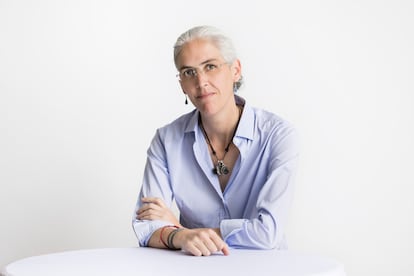Pamela San Martín: ‘I can read seven tweets and become an instant expert’
This Mexican lawyer and member of Meta’s Oversight Board provides insights into the internet’s impact on democracy

In May 2022, Pamela San Martín became a member of Meta’s Oversight Board for content moderation decisions. The prominent Mexican attorney and election consultant joined this organization two years after it was established to advise on Meta’s social networks. The Board’s “verdicts” may take a few weeks to deliver, but they significantly contribute to Meta’s long-term policies and actions. San Martín and Catalina Botero Marino of Colombia are the sole representatives from Spanish-speaking countries among the 22 Board members.
In the three years since the Board’s establishment, several events have occurred that have weakened its influence. In this interview, San Martín, who will serve for another three years and possibly longer, reflects on the influence of social media and Meta’s Oversight Board on contemporary politics.
Question. You have been working in politics and election campaigns for over a decade and are now on Meta’s Oversight Board. What have social networks changed?
Answer. Social networks have completely transformed political campaigns. In the past, the media acted as intermediaries, spotlighting information they deemed strategic or important. The candidates also relied on the media and spent heavily on advertising to get their messages out. But things have changed. Now, candidates have become their own media, utilizing alternative forms of information dissemination like influencers. It’s been a monumental shift.
Q. Is that good or bad?
A. It’s both good and bad. Creating a closer, more two-way relationship with aspiring public officials is one benefit, but losing intermediation has its consequences. Instead of traditional media with diverse audiences, we now have social media communities that echo our own thoughts and desires, fragmenting reality. During election campaigns, transcending our own community becomes a challenge. Even if presented with a compelling argument, we may hesitate to accept it if it means losing support. It’s harder to connect with people outside our own fragmented worlds, which impacts democratic debate and leads to more polarization. It’s a war of ideas, this polarization, and leaves little room for dialogue. Without media mediation, there is less clarity, counterbalancing arguments and investigative reporting. Moreover, the immediacy of social media leaves little room for nuanced discussions.
Q. Now that you’re on Meta’s Board, do you see things the same way?
A. One of the things that really struck me when I joined the Board was just how massive and constant the flow of content is — millions of pieces of content circulate every single day.
Q. But each user only sees their own screen.
A. Yes, and it’s important to understand why certain content isn’t eliminated, even if it seems like a clear violation. With 350 million photos uploaded daily on Facebook, even with 99% accuracy, which is impressive for any system, we’d still have 3.5 million errors when analyzing photos. To make more accurate decisions, one has to be cautious about content removal. However, this approach can result in allowing harmful content, including child sexual exploitation.
“When big problems come up, that’s when we really start paying attention to what might not be working”
Q. Child pornography is the ultimate test of moderation.
A. It’s probably one of the most overapplied policies across platforms in general. For example, there’s this user from Argentina who uploaded a picture of his adorable but naked little grandson in the swimming pool. Now he’s absolutely livid because his post got taken down. And honestly, he’s got a point. But when you stop to think about the implications of enforcing rules on such a massive scale, you realize it’s all about learning to live with a certain margin of error. It’s a perspective that changes quite a bit when you’re looking at it from the inside.
Q. What other case taken up by the Board surprised you the most once you saw it from the inside?
A. Implementing policies to address dangerous individuals and organizations significantly affects freedom of speech, particularly given the broad support, representation and praise for such organizations. This caught my attention and offered me a new perspective that I wouldn’t have seen otherwise.
Q. Facebook’s significance has diminished since the Board was created. The company is now known as Meta. TikTok has become dominant, while Twitter focuses on being the free-speech platform. Lots of changes have happened.
A. It’s a step forward to have self-regulation or co-regulation mechanisms like the Board. You know what’s interesting about our societies? We tend to have short memories. We forget about problems until a big one comes along. Remember when these moderation boards became a hot topic again? It was when Elon Musk took over Twitter and completely upended things. That’s when we remembered that some platforms have these control mechanisms in place. So, why was the Meta’s Board created? It was after the whole Cambridge Analytica scandal. When big problems come up, that’s when we really start paying attention to what might not be working. It’s not just the social networks or the news media that are all over the place — we’re all distracted too. We don’t know what to focus on anymore: the autocratic ruler, the plight of migrants, animal rights or the war in Ukraine. That’s something that has really changed. Back in the days of traditional media, information felt a bit more organized. But now, our attention is so scattered, and we only seem to care when something big happens.
Q. Who in politics has benefited the most from the emergence of social media?
A. Social media has this tremendous potential to shape elections. In Mexico, television once wielded a remarkable influence, but now we are seeing political figures emerge through the power of social media.
“Social media has been very useful for anti-establishment and populist candidates who manipulate emotions”
Q. Regardless of their ideology?
A. Social media has been very useful for anti-establishment and populist candidates who manipulate emotions. They can be from the left or the right. Populists were always thought of as left-wing, but suddenly we have politicians like Trump, Bolsonaro [Brazil] and Erdogan [Turkey]. The problem is that societies, Spain included, increasingly suffer from extreme polarization. And the thing is, we’re losing the ability to see the impacts on others and the unintended consequences of decisions. Sometimes, we think we’ll be happy if legislation is passed to regulate social media and remove certain content. But what we don’t see is the unintended impacts of this regulation. We no longer have the ability to hold conversations, to see and talk with experts. Now we’re all experts — I can read seven tweets and become an instant expert on Spanish history. Suddenly, I have a strong opinion about whether [the far-right party] Vox or [Prime Minister Pedro] Sánchez are good or bad. We have all become political analysts overnight. This has an impact on both society and politicians. Experience shows that politicians no longer prioritize seeking factual evidence to support their interests.
Q. Who has lost the most from social media’s influence on politics?
A. I don’t believe that social networks are a loss for society. I believe social media platforms have great potential for democratization, but we must also be cautious of the harm they can cause. Unfortunately, they pose a significant challenge for traditional media. Many media outlets are facing complex financial challenges and serious news sources are dwindling. They’re caught between chasing likes and providing reliable information. The excessive use of exclamation marks in headlines is a troubling trend that, in my opinion, has a detrimental impact on society. I understand the challenges confronting the media and empathize with their problems. I have had conversations with media owners who are working hard to overcome these challenges. However, they tell me that it’s getting more difficult every day.
Sign up for our weekly newsletter to get more English-language news coverage from EL PAÍS USA Edition
Tu suscripción se está usando en otro dispositivo
¿Quieres añadir otro usuario a tu suscripción?
Si continúas leyendo en este dispositivo, no se podrá leer en el otro.
FlechaTu suscripción se está usando en otro dispositivo y solo puedes acceder a EL PAÍS desde un dispositivo a la vez.
Si quieres compartir tu cuenta, cambia tu suscripción a la modalidad Premium, así podrás añadir otro usuario. Cada uno accederá con su propia cuenta de email, lo que os permitirá personalizar vuestra experiencia en EL PAÍS.
¿Tienes una suscripción de empresa? Accede aquí para contratar más cuentas.
En el caso de no saber quién está usando tu cuenta, te recomendamos cambiar tu contraseña aquí.
Si decides continuar compartiendo tu cuenta, este mensaje se mostrará en tu dispositivo y en el de la otra persona que está usando tu cuenta de forma indefinida, afectando a tu experiencia de lectura. Puedes consultar aquí los términos y condiciones de la suscripción digital.









































